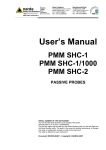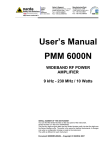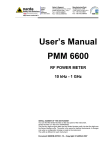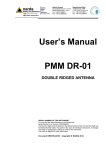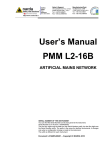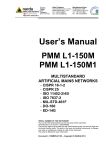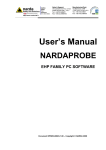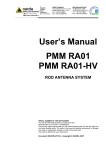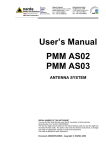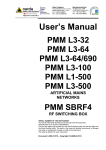Download User`s Manual
Transcript
NARDA Safety Test Solutions S.r.l. Socio Unico Sales & Support: Via Leonardo da Vinci, 21/23 20090 Segrate (MI) - ITALY Tel.: +39 02 2699871 Fax: +39 02 26998700 Manufacturing Plant: Via Benessea, 29/B 17035 Cisano sul Neva (SV) Tel.: +39 0182 58641 Fax: +39 0182 586400 http://www.narda-sts.it User’s Manual PMM SHC-1/1000 PMM SHC-2/1000 CISPR PASSIVE PROBES SERIAL NUMBER OF THE INSTRUMENT You can find the Serial Number on the handle of the probe Serial Number is in the form : 0000X00000. The first four digits and the letter are the Serial Number prefix, the last five digits are the Serial Number suffix. The prefix is the same for identical instruments, it changes only when a configuration change is made to the instrument. The suffix is different for each instrument. Document SHCEN-40710 – Copyright © NARDA 2014 NOTE: ® Names and Logo are registered trademarks of Narda Safety Test Solutions GmbH and L3 Communications Holdings, Inc. – Trade names are trademarks of the owners. If the instrument is used in any other way than as described in this Users Manual, it may become unsafe Before using this product, the related documentation must be read with great care and fully understood to familiarize with all the safety prescriptions. To ensure the correct use and the maximum safety level, the User shall know all the instructions and recommendations contained in this document. This products are a Safety Class I and Installation Category II instrument according to IEC classification and has been designed to meet the requirements of EN61010-1 (Safety Requirements for Electrical Equipment for Measurement, Control and Laboratory Use). This product has a Pollution Degree II normally only non-conductive pollution occurs. Occasionally, however, a temporary conductivity caused by condensation must be expected. The information contained in this document is subject to change without notice. KEY TO THE ELECTRIC AND SAFETY SYMBOLS: You now own a high-quality instrument that will give you many years of reliable service. Nevertheless, even this product will eventually become obsolete. When that time comes, please remember that electronic equipment must be disposed of in accordance with local regulations. This product conforms to the WEEE Directive of the European Union (2002/96/EC) and belongs to Category 9 (Monitoring and Control Instruments). You can return the instrument to us free of charge for proper environment friendly disposal. You can obtain further information from your local NARDA Sales Partner or by visiting our website at www.narda-sts.it . Warning, danger of electric shock Earth Read carefully the Operating Manual and its instructions, pay attention to the safety symbols. Unit Earth Connection Earth Protection Equipotential KEY TO THE SYMBOLS USED IN THIS DOCUMENT: The DANGER sign draws attention to a potential risk to a person’s DANGER safety. All the precautions must be fully understood and applied before proceeding. WARNING The WARNING sign draws attention to a potential risk of damage to the apparatus or loss of data. All the precautions must be fully understood and applied before proceeding. CAUTION The CAUTION sign draws attention against unsafe practices for the apparatus functionality. NOTE: II The NOTE draw attention to important information. Note and symbols Contents Important safety warning………………………………….. Safety recommendations and instructions.………....... EC Conformity Certificate PMM SHC-1/1000…............. EC Conformity Certificate PMM SHC-2/1000…............. Page V V VI VI 1 General Information 1.1 Documentation…….…………...……………….……….. 1.2 Introduction Passive probes……………………........... 1.3 Insertion loss……………….........................…..…….. 1.4 Shipping components.................................…......... 1.5 Packing Unpacking…………………………………….... 1.6 Environment…………………………………………….... 1.7 Return for service…………......................…...…......... 1.8 Equipment cleaning……………………………………… Page 1-1 1-1 1-1 1-2 1-2 1-2 1-2 1-2 2 PMM SHC Passive probes 2.1 Main Specification ………………………………………. 2.2 Passive probes and accessories………………………. 2.3 PMM SHC-1/1000 passive probe schematics……….. 2.4 PMM SHC-2/1000 passive probe schematics……….. Page 2-1 2-1 2-2 2-2 3 Preparation for use 3.1 Introduction….…………………………………………… 3.2 Packing unpacking……………...………………………. 3.3 Initial inspection…………….……………………………. 3.4 Preparation for use……………………………………... 3.5 Equipment cleaning …………………………………….. Page 3-1 3-1 3-1 3-1 3-2 Contents III Figures Figure 1-1 2-1 2-2 2-3 Page Equivalent CISPR circuit…………………….………….. Passive probe and accessories………………………… PMM SHC-1/1000 Passive Probes schematics…….. PMM SHC-2/1000 passive probe schematics……….. 1-1 2-1 2-2 2-2 Tables Table Page Main Specification…………………….….……………… 2-1 IV Contents 2-1 IMPORTANT SAFETY WARNING As specified in the Italian law Art. 345 of DPR 547 issued on 27.04.1955 when measurements are made on circuits carrying hazardous supply voltage, using an insulated probe where a metallic part is accessible, is not allowed. It is possible to use an insulated alligator clip instead, in this case the high voltage circuit must be protected by means of a low voltage safety interlock circuit, capable to cut off high voltage before any alligator clip or probe operation. The user must install safety protection with a low voltage interlock circuit before any use of PMM SHC1/1000 or PMM SHC-2/1000 passive probes on hazardous voltage circuit. The NARDA assumes no liability for the customer’s failure to comply with these requirements. SAFETY RECOMMENDATIONS AND INSTRUCTIONS This product has been designed, produced and tested in Italy, and it left the factory in conditions fully complying with the current safety standards. To maintain it in safe conditions and ensure correct use, these general instructions must be fully understood and applied before the product is used. • When the device must be connected permanently, first provide effective grounding; • If the device must be connected to other equipment or accessories, make sure they are all safely grounded; • In case of devices permanently connected to the power supply, and lacking any fuses or other devices of mains protection, the power line must be equipped with adequate protection commensurate to the consumption of all the devices connected to it; • In case of connection of the device to the power mains, make sure before connection that the voltage selected on the voltage switch and the fuses are adequate for the voltage of the actual mains; • Devices in Safety Class I, equipped with connection to the power mains by means of cord and plug, can only be plugged into a socket equipped with a ground wire; • Any interruption or loosening of the ground wire or of a connecting power cable, inside or outside the device, will cause a potential risk for the safety of the personnel; • Ground connections must not be interrupted intentionally; • To prevent the possible danger of electrocution, do not remove any covers, panels or guards installed on the device, and refer only to NARDA Service Centers if maintenance should be necessary; • To maintain adequate protection from fire hazards, replace fuses only with others of the same type and rating; • Follow the safety regulations and any additional instructions in this manual to prevent accidents and damages. • The probe cannot be handled in proximity of high voltage mains line. • If the probe is to be connected to high voltage mains line a safety interlock equipment must be installed to ensure the mains line be switched off before any probe handling or connection • The user must provide a safety protection cover with a low voltage interlock switch able to cut off mains voltage before probe handling or connection. Safety consideration V EC Conformity Certificate (in accordance with the directives: EMC 89/336/EEC and low voltage 73/23/EEC) This is to certify that the product: PMM SHC-1/1000 Passive Probes Produced by: NARDA S.r.l. Safety Test Solution Via Benessea 29/B 17035 Cisano sul Neva (SV) - ITALY complies with the following European Standards Safety: CEI EN 61010-1 (2011) and CEI EN 61010-031 (2004) EMC: According to art. 1, par. 3 of 2004/108/CE Directive the product herewith is built by passive electric components and does not cause electromagnetic disturbances or its performance is not affected by such disturbances This product complies with the requirements of the Low Voltage Directive 2006/95/CE. NARDA Safety Test Solutions EC Conformity Certificate (in accordance with the directives: EMC 89/336/EEC and low voltage 73/23/EEC) This is to certify that the product: PMM SHC-2/1000 Passive Probe Produced by: NARDA S.r.l. Safety Test Solution Via Benessea 29/B 17035 Cisano sul Neva (SV) - ITALY complies with the following European Standards Safety: CEI EN 61010-1 (2011) and CEI EN 61010-031 (2004) EMC: According to art. 1, par. 3 of 2004/108/CE Directive the product herewith is built by passive electric components and does not cause electromagnetic disturbances or its performance is not affected by such disturbances The product herewith complies with the requirements of the Low Voltage Directive 2006/95/CE. NARDA Safety Test Solutions VI EC Conformity 1 - General Information 1.1 Documentation Enclosed with this manual are a service questionnaire to send back to NARDA in case that equipment service is needed, and an accessories check list to verify all accessories enclosed in the packaging, as well as a calibration certificate. 1.2 Introduction to Passive Probes When LISN (Line Impedance Stabilization Network) are not applicable to EMI conducted test because the current flowing is too high, the conducted interferences are measured by means of a high impedance voltage probe, according to C.I.S.P.R 16-1-2. The passive probes are designed to comply with C.I.S.P.R. 16-1-2 regulation and thus include a blocking capacitor to decouple the measured signal from any AC supply voltage which may be present on the line under test, they have a total internal resistance between line and earth of more than 1500 ohm. Uncompromised design and construction for reliable and safe operation together with PMM EMI receivers like the PMM 9010 or any other suited RF receiver. The following figure shows the CISPR equivalent circuit. Fig. 1-1 Equivalent CISPR circuit 1.3 Insertion loss The insertion loss of the probes is calibrated in a 50 ohm system over the frequency range of 9 kHz to 30 MHz. The only difference from PMM SHC-1/1000 and PMM SHC-2/1000 probes is the insertion loss respectively 35dB typical for SHC-1/1000 and 30 dB typical for SHC-2/1000. The attenuation of the probes must be taken into account during measurement, the level indicated on the receiver must be increased of 30 or 35 dB corresponding to the attenuation of the probe used. Document SHCEN-40710 - © NARDA 2014 General Information 1-1 1.4 Shipping components The passive probes kit is composed by the following parts: • The passive probe • Test probe tip and safety cap • Test alligator clip • BNC-BNC coaxial cable 2m length • Operating Manual • Calibration Certificate • Return for repair form 1.5 Packing/Unpacking Inspect the shipping container for damage. If the shipping container or cushion material is damaged, it should be kept until the contents of the shipment have been checked for completeness and the instrument has been checked mechanically and electrically. Verify the accessories availability in the shipping container referring to the accessories check list enclosed with the Operating Manual. Notify any damage to the carrier as well as the NARDA Representative. 1.6 Environment The operating environment is specified to be within the following limitations : 0° to +45° C • Temperature < 90% relative • Humidity The instrument should be stored in a clean, dry environment The storage and shipping environment is specified to be within the following limitations : -25° to + 70° C • Temperature < 95% relative • Humidity 1.7 Return for service If the instrument should be returned to NARDA for service, please complete the service questionnaire enclosed with the Operating Manual and attach it to the instrument. To minimize the repair time, be as specific as possible when describing the failure. If the failure only occurs under certain conditions, explain how to duplicate the failure. If possible, reuse of the original packaging to ship the equipment is preferable. In case other package should be used ensure to wrap the instrument in heavy paper or plastic. Use a strong shipping container and use enough shock absorbing material around all sides of the equipment to provide a firm cushion and prevent movement in the container. Seal the shipping container securely with shipment tape. Mark the shipping container FRAGILE to encourage careful handling. 1.8 Equipment cleaning Use a clean, dry non abrasive cloth for external cleaning of the equipment. To clean the equipment do not use any solvent, thinner, turpentine, acid, acetone or similar matter to avoid damage to external plastic and surfaces. 1-2 General Information 2 – PMM SHC Passive Probes 2.1 Main specifications Table 2-1 lists performance specifications. TABLE 2-1 Main specifications Frequency range 9 kHz to 30 MHz Input resistance 1500 Ω ± 80 Ω Input reactance < 1500 Ω (< 1200 Ω typical) Insertion Loss SHC-1/1000 SHC-2/1000 RF Output 50 Ω BNC female Max permissible input operating voltage 1000 Vac; 1500 Vdc EUT Terminal 4 mm jack with alligator and probe tip Ground connection Alligator clip Operating temperature 0 °C to + 45 °C Storage temperature - 25 °C to + 70 °C Dimensions (W x H x D) 45 x 45 x 200 mm Weight 0,25 kg 35 dB ± 1,5 dB 30 dB ± 1,5 dB Fig. 2-1 Passive probe and accessories 2.2 Passive Probes and accessories Legend: 1- Passive probe 2- Test probe tip and safety cap 3- Test alligator clip 4- BNC-BNC coaxial cable 2m length 5- RF input probe tip 6- RF Ground lead alligator clip Document SHCEN-40710 - © NARDA 2014 PMM SHC Passive probe 2-1 2.3 PMM SHC-1/1000 passive probe schematics Fig. 2-2 PMM SHC-1/1000 passive probe schematics 2.4 PMM SHC-2/1000 passive probe schematics Fig. 2-3 PMM SHC-2/1000 passive probe schematics 2-2 PMM SHC Passive probe 3 - Preparation for use 3.1 Introduction This section provides the information needed to install the passive probes. Included is information pertinent to initial inspection, power requirements, interconnections, environment, instrument mounting, cleaning, storage and shipment. 3.2 Packing Unpacking Inspect the shipping container for damage. If the shipping container or cushion material is damaged, it should be kept until the contents of the shipment have been checked for completeness and the instrument has been checked mechanically and electrically. Verify the accessories availability in the shipping container referring to the accessories check list enclosed with the Operating Manual. Notify any damage to the carrier as well as the NARDA Representative. 3.3 Initial inspection Inspect the probe for damage before use. To avoid hazardous electrical shock, do not use the passive probe when there are signs of shipping damage to any portion of it. 3.4 Preparation for use The BNC plug of the passive probe must be connected to the RF input socket of the EMI test receiver. To avoid any damage caused by transient current pulses, it is advisable to use a pulse limiter between the passive probe and the RF input of the EMI test receiver. Depending on the measurement to be performed, the passive probe can be used either with the test probe tip or the alligator clip provided as accessories. For connections where is difficult to hang the alligator clip to the circuit, the test probe tip provided can be used, plugging it on the passive probe. When measurements are made on circuits carrying hazardous AC supply voltage the alligator clip provided can be used, taking care to connect the alligator clip and the passive probe before energizing the circuit under test. The attenuation of the probes must be taken into account during measurement, the level indicated on the receiver must be increased of 30 or 35 dB corresponding to the attenuation of the probe used. Document SHCEN-40710 - © NARDA 2014 Preparation for use 3-1 Input RF ground connection of the passive probe is very important for interfering voltage measurement in the range 9 kHz to 30 MHz, it should be less than λ/100. A rather short ground connection is always desirable to avoid picking up other interferences. The passive probes ground connection is 15 cm long. For measurements where the RF ground requires a longer ground lead the total length must be less than or equal to one tenth of the wavelength of the frequency to be measured. Before connecting passive probe to the associated test instrument, ensure that an uninterruptible safety earth ground is provided from the main power source to the EMI test receiver protective earth connection. To avoid hazardous electrical shock, the passive probe must be connected to the supply mains under test only before energizing any circuit. To avoid hazardous electrical shock, prior to energizing either unit and prior passive probe connection, verify that a common ground exists between EMI test receiver and ground to be connected to the passive probe RF input ground. To avoid hazardous electrical shock, take care to ground the passive probe RF input ground to the AC supply earth or, if this cannot be done, to ground the probe permanently to the protective earth ground conductor. Any interruption or loosening of the protective earth ground conductor, either inside or outside the units or in an extension cable will cause a potential shock hazard that could result in personal injury. Verify the safety earth ground functionality before operation. 3.5 Equipment cleaning Use a clean, dry non abrasive cloth for external cleaning of the probe. To clean the equipment do not use any solvent, thinner, turpentine, acid, acetone or similar matter to avoid damage to external plastic and surfaces. 3-2 Preparation for use NARDA Safety Test Solutions S.r.l. Socio Unico Sales & Support: Via Leonardo da Vinci, 21/23 20090 Segrate (MI) - ITALY Tel.: +39 02 2699871 Fax: +39 02 26998700 Manufacturing Plant: Via Benessea, 29/B 17035 Cisano sul Neva (SV) Tel.: +39 0182 58641 Fax: +39 0182 586400 http://www.narda-sts.it Mod. 18-1 Caro cliente grazie per aver acquistato un prodotto NARDA! Sei in possesso di uno strumento che per molti anni ti garantirà un’alta qualità di servizio. NARDA riconosce l'importanza del Cliente come ragione di esistenza; ciascun commento e suggerimento, sottoposto all'attenzione della nostra organizzazione, è tenuto in grande considerazione. La nostra qualità è alla ricerca del miglioramento continuo. Se uno dei Suoi strumenti NARDA necessita di riparazione o calibrazione, può aiutarci a servirla più efficacemente compilando questa scheda e accludendola all’apparecchio. Tuttavia, anche questo prodotto diventerà obsoleto. In questo caso, ti ricordiamo che lo smaltimento dell'apparecchiatura deve essere fatto in conformità con i regolamenti locali. Questo prodotto è conforme alle direttive WEEE dell’Unione Europea (2002/96/EC) ed appartiene alla categoria 9 (strumenti di controllo). Lo smaltimento, in un ambiente adeguato, può avvenire anche attraverso la restituzione del prodotto alla NARDA senza sostenere alcuna spesa. Può ottenere ulteriori informazioni contattando i venditori NARDA o visitando il nostro sito Web www.narda-sts.it. Dear Customer thank you for purchasing a NARDA product! You now own a high-quality instrument that will give you many years of reliable service. NARDA recognizes the importance of the Customer as reason of existence; in this view, any comment and suggestion you would like to submit to the attention of our service organization is kept in great consideration. Moreover, we are continuously improving our quality, but we know this is a never ending process. We would be glad if our present efforts are pleasing you. Should one of your pieces of NARDA equipment need servicing you can help us serve you more effectively filling out this card and enclosing it with the product. Nevertheless, even this product will eventually become obsolete. When that time comes, please remember that electronic equipment must be disposed of in accordance with local regulations. This product conforms to the WEEE Directive of the European Union (2002/96/EC) and belongs to Category 9 (Monitoring and Control Instruments). You can return the instrument to us free of charge for proper environment friendly disposal. You can obtain further information from your local NARDA Sales Partner or by visiting our website at www.narda-sts.it. Servizio richiesto: Service needed: Solo taratura Calibration only Riparazione Repair Riparazione & Taratura Repair & Calibration Taratura SIT Certified Calibration Altro: Other: Ditta: Company: Indirizzo: Address: Persona da contattare: Technical contact person: Telefono: Phone n. Modello: Equipment model: Numero di serie: Serial n. Accessori ritornati con l’apparecchiatura: Nessuno Cavo(i) Cavo di alimentazione Accessories returned with unit: None Cable(s) Power cable Altro: Other: Sintomi o problemi osservati: Observed symptoms / problems: Guasto: Fisso Intermittente Failure: Continuous Intermittent Sensibile a : Freddo Sensitive to: Cold Caldo Heat Descrizione del guasto/condizioni di funzionamento: Failure symptoms/special control settings description: Se l’unità è parte di un sistema descriverne la configurazione: If unit is part of system please list other interconnected equipment and system set up: Vibrazioni Altro Vibration Other Suggerimenti / Commenti / Note: Suggestions / Comments / Note:














